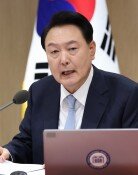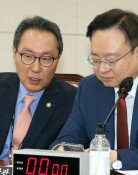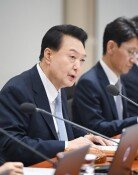The pledge conundrum
The pledge conundrum
Posted May. 06, 2017 08:05,
Updated May. 06, 2017 08:24
As the presidential candidate for the Democratic Party, former President Roh Moo-hyun announced his pledge to relocate administrative bodies to the Chungcheong provinces on Sept. 30, 2002 when he was campaigning at the pledged region. It was only three months before the presidential election date. As a candidate hailed from the Gyeongsang provinces and backed by the Jeolla province-based party, it was his plan to win the minds of Chungcheong voters. Roh's plan was also in hindsight by Cheong Wa Dae correspondents. While his pledge later created a fierce bipartisanship and led to national inefficiencies, Roh "had some fun" in his own words. After many twist and turns, the groundbreaking ceremony took place in Sejong City in July 2007; his last term at the office.
Interviews with camps of presidential candidates show that policies are often neglected. What's more, policies rarely make the headlines, as they are shadowed by verbal mistakes, negative attacks, and past comments. When one party pledges 6 percent of economic growth, the other party will just announce 7 percent. So many pledges such as shorter military service periods and higher welfare allowances are often impromptu. Then-candidate Roh's pledge to relocate administrative bodies worked well not because there was a mere difference between figures, but in fact was a game-changing card.
In ordinary cases, pledges made during campaigns will be taken off the list and readjusted during the two-month transition after newly-elected president takes office. This is when experts call to "remove the raft once you cross the river." It is also this commission where public servants rounds up the tax figures and require budgets when pledges are fully implemented. Alter hearing the unfeasible pledges churned out at every campaign, educated voters also know that the nation will go bankrupt once the next government fulfills all pledges.
However, next president after the recent fast-forwarded election will not be reviewed by the commission and will head straight to the presidential office. Though candidates fiercely debated over tens of trillions-won worth pledges during TV debates, improvised ones are not trustworthy. Once voters are inclined to choose candidates based on their individual interests, they are likely to be swayed by sweet talks. This is why some argue that it is far easier to pick a reliable candidate based on his or her words, behavior, and facial expression revealed during the debate. You can neither trust nor ignore pledges during presidential campaigns in Korea.
Young-Hae Choi yhchoi65@donga.com
Headline News
- Israel prepares for retaliation against Iran
- Samsung reclaims top spot, surpassing Apple in smartphone market
- 77% of Koreans in 20s and 30s are 'Kangaroo Tribe' due to job crisis
- KBO referees embroiled in controversy over ABS decision concealment
- Inflation, oil price surge put double shock on global economy







